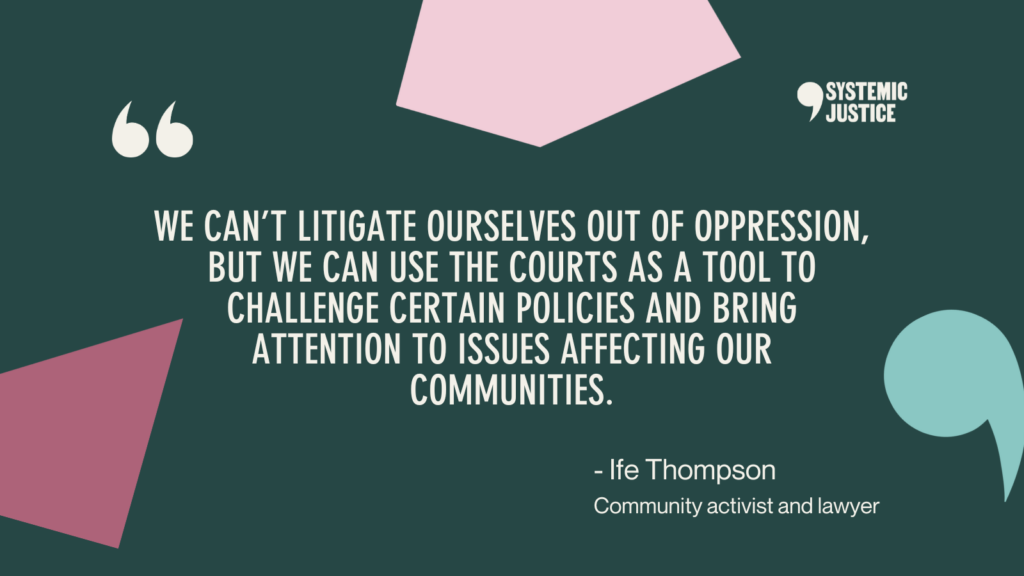An integral component of our community-driven approach is building resources to support communities in accessing legal knowledge and know-how on their own terms. On 13 November, we launched our very first community toolkit for change, a series of resources on how communities can leverage the courts for their causes and campaigns. The toolkit seeks to demystify and deconstruct how the law and litigation can be used strategically to push for change on communities’ own terms, and includes a guide for legal action, a glossary of essential legal terms, and a conversation starter for communities to begin exploring the potential of litigation in their own spaces.
To celebrate the launch of these resources, on 14 November, we held an online webinar on how communities can use litigation in their fights for justice, together with two incredible guests:
- Ife Thompson, movement lawyer, UN fellow, community activist, curator, Black history expert, and founder of Black Protest Legal Support UK;
- Jonathan Lee, Romani activist and Advocacy and Communications Director at the European Roma Rights Centre (ERRC).
Together, we explored both the limits and potential of using litigation as a “tool in the toolbox” for change, how to reframe legal strategies in the pursuit of collective liberation, and the transformative power of community-driven, movement-led legal action.

We started off by acknowledging the ways in which the courts and traditional lawyering practices can reproduce harm for communities facing compound and systemic injustices – ultimately making litigation feel remote and inaccessible.
Speaking from their experience, Ife and Jonathan both delved into how this tension between lawyering, the courts, and liberation struggles can be bridged if we reframe litigation and the courts from the perspectives of the communities we are in movement with.
By centring the needs, dreams, and visions for change of movements and communities fighting injustice, a litigation strategy can become much more than just a win in the courts, but a component on which to further build momentum for change. For example, Ife spoke about how a whole community stepped forward in Manchester, UK to resist “joint enterprise” convictions and call for restorative justice.

Both Ife and Jonathan shared how the “strategic” part of strategic litigation can look very different when you are centring the needs and interest of your community.
Reflecting on what it means to undertake strategic litigation as a Roma-led organisation, Jonathan shared how litigation can be put at the service of activism, especially to create a factual record of human rights abuses and systemic harm – something very important to the Roma rights movement.

For example, Jonathan spoke about how the ERRC is mainly using litigation to demand desegregated housing and education, as well as “to keep roofs over Romani families’ heads when the local council wants to evict them, to keep the lights on when power companies use illegal collective meters”, to sue water authorities “when they refuse to connect Romani neighbourhoods, and most often to take governments to international courts when police officers brutalise, torture, and kill Roma.”
He noted that these are not the sort of cases that a typical lawyer would find “strategic”, but they reflect the priorities and objectives of the communities the ERRC represents.

Litigation is an essential tool in the toolbox alongside political and human rights advocacy, campaigning, community activism, and social journalism, and one which can help galvanise support for campaigns. All the parts that contribute to bringing about change – advocacy, movement building, campaigning, protest, and litigation – need to move together to fulfil a common vision. If we see litigation as a standalone objective, we miss out on the bigger picture.
Watch the full panel discussion here to hear more about our community toolkit and how strategic litigation can be leveraged for your causes and campaigns.
Learn more about our work to build the knowledge and power of communities and movements resisting injustice here.
Our full community toolkit for change can be freely downloaded here: https://systemicjustice.ngo/community-toolkit/
